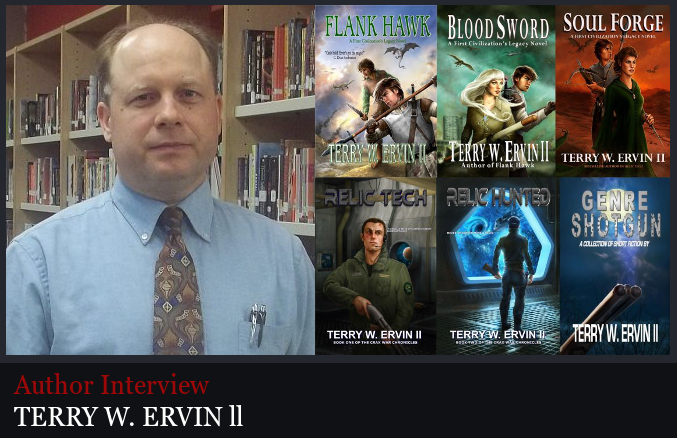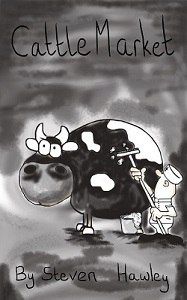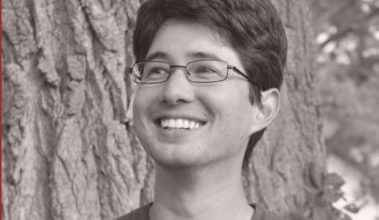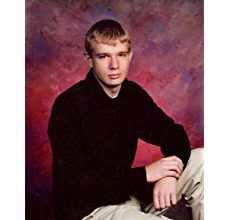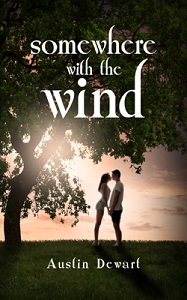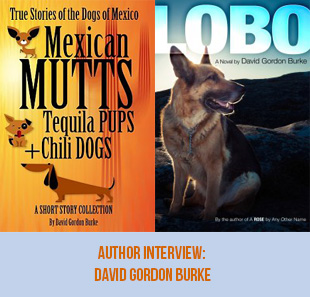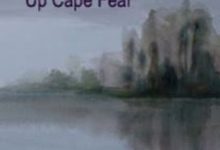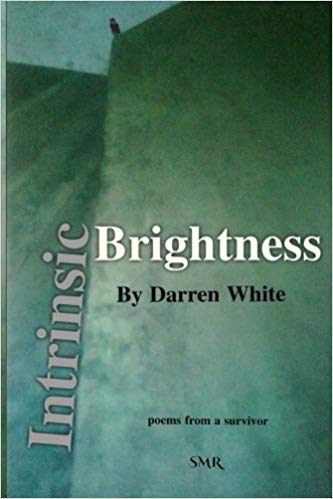Interview with Terry W. Ervin II
Terry W. Ervin II is an English and science teacher who enjoys writing fantasy and science fiction. His First Civilization’s Legacy Series (fantasy) includes Flank Hawk, Blood Sword, and Soul Forge. The Crax War Chronicles, his science fiction series, includes Relic Tech and Relic Hunted (his most recent release from Gryphonwood Press).
Terry has been a member of WritingForums since 2010 and can often be seen sharing valuable advice on the Writing Discussion forum.
Terry, please tell us a little about yourself including interests and hobbies.
First, thank you for the opportunity to share with the readers and visitors of WritingForums.com.
I am a busy person, as are most writers. In addition to spending time with my family (wife and two daughters) and all that entails, I am an English teacher at a career technical high school, e-course instructor, village councilman and, no surprise here, an author.
For hobbies, I enjoy reading and listening to audio books, mainly fantasy, science fiction, and history. I also raise turtles in my basement. Red-eared and Yellow-bellied sliders and Eastern Box turtles, for those who might be interested.
Who or what inspired you to become a writer?
I am not sure there is any single event or individual that inspired me to become a writer. I enjoy reading, of course, and as an English teacher, I certainly see the value in reading—both fiction and nonfiction. Why not be a creator of some of the works out there? I think many authors write the novels that they’d like to find on bookshelves, if they hadn’t written those books themselves. I am one of those authors. But, in the end, I have stories that I want to share.
You write both SciFi and Fantasy, is there a genre that you would not attempt to write?
It’s unlikely that I will write romance. Nothing wrong with the genre or content, it’s just not something I enjoy reading, and it’s not something I think I have a grasp on writing.
Could I do it? Probably. But I think one of the best ways to learn to be a good writer is to read the works of other authors, especially within a genre. Read for enjoyment, yes, but then reread, paying attention to what worked in those novels. Study the structure and dialogue and pacing and…you get the point. When I get stuck in a certain aspect of writing a scene, I go and see how other successful authors have accomplished that aspect. I read, reread, take notes, and then apply what I learned to my own writing style and story being told.
Thus, to write romance would require me to do a lot of reading and rereading of romance novels. It’s not something I would find interesting or enjoy.
What was the inspiration behind your first published fantasy novel Flank Hawk?
The initial thought that sparked Flank Hawk occurred while driving home from work. I was thinking about a few of the books I’d recently reread, Zelazny’s Guns of Avalon and Harry Turtledove’s World War: In the Balance. One of the main turning points in Guns of Avalon occurs when Prince Corwin discovers a way to get gunpowder to function in the magical city of Amber. In the Balance is about an alien invasion during the height of World War II. The disparity in technology between the invaders and humanity is a major element in the novel’s conflict. Then I began to ponder, what would happen if a dragon encountered a World War II aircraft? Okay, maybe one can see how the line of thought formed. From there I began to devise a world where such an encounter could take place.
Next came the people and creatures that would inhabit the post-apocalyptic world, how it came to be, and the long-running, multi-layered power struggle that would come to influence events in the plot that I was devising. Finally, came Krish and Lilly, Roos and Road Toad—the main characters in the novel.
What is the book about?
Flank Hawk is the first book in the First Civilization’s Legacy Series. The setting is in a post-apocalyptic future, where both magic and mythical creatures exist, along with remnants of technology.
Back of the Book Description: What happens when fire-breathing dragons battle Stukas for aerial supremacy over a battlefield? Can an earth wizard’s magic defeat a panzer? Krish, a farmhand turned mercenary, witnesses this and much more as he confronts the Necromancer King’s new war machines resurrected from before the First Civilization’s fall. Worse yet, a wounded prince tasks Krish to find the fabled Colonel of the West and barter the royal family’s malevolent Blood Sword for a weapon to thwart the Necromancer King’s victory.
Blood Sword and Soul Forge are the next two books in the series, each written to stand alone while complementing the other books in the series.
All of the novels are action/adventure fantasy, centering on the themes of loyalty, friendship and sacrifice.
Here’s what one author had to say:
“A curious blend of epic fantasy, modern techno-thriller and non-stop action-adventure, Flank Hawk is a compelling and original tale of a brave young mercenary pitched in deadly magical combat against the undead techno-armies of the Necromancer King. Whether you like swashbuckling wizardry, fierce dragon battles, modern military hardware or sword-slashing zombie mayhem, Flank Hawk has it all.”
—Erica Hayes, author of the Shadowfae Chronicles
Did you follow the traditional publishing route or self-publish?
I followed the traditional route.
If traditionally published, how did you find a publisher?
I did not seek an agent. Rather, since the major fantasy/SF publishers accept unsolicited manuscripts, I went the ‘slush pile’ route.
Although Flank Hawk was my first published novel, Relic Tech was the first novel I wrote. Turns out it took years for Relic Tech to find a publisher. It made it out of the slush pile at Tor, where I got instructions on revisions and was directed to send it to an editor for consideration. A nice rejection letter arrived about 18 months later, and the recommendation to send it to Baen, as they publish more military SF. So I did. There, Relic Tech ran the slush pile gauntlet, getting passed up through the slush pile editor, where it languished for a while, until an editor there gave it a read. It was ultimately rejected but, by that time, Flank Hawk had been written and found a publisher (Gryphonwood Press). Since two other publishers had shown interest in Relic Tech, my current publisher was interested, and ultimately published it.
Interestingly, Flank Hawk made it out of the slush pile with three publishers as well, only to be rejected by the first two, but found a home with the third.
Your latest novel Relic Hunted, is the second in your SciFi Crax War Chronicles, what is the novel about?
Relic Hunted picks up where Relic Tech left off. Security Specialist Keesay, a Relic Tech (meaning he mainly uses or relieson late 20th century technology), has recovered from his war injuries after surviving the experimental Cranaltar device.
Back of the Book Description: Intelligence picks up Security Specialist Keesay’s contract, hoping to direct the Relic’s tenacity and skills against his nemesis, the Capital Galactic Investment Group. But the rogue corporation has its own plans concerning Keesay: a bounty on the security specialist’s head.
Time is running out for mankind, with the Crax striking deep into human territory, targeting colonies on Pluto and Io. Keesay knows whatever plans others might have, fighting the Crax is more important than blending in, or looking over his shoulder.
Stepping forward, Keesay accompanies Special Agents Guymin and Vingee on their mission to rescue key prisoners taken by Capital Galactic, before they’re handed over to the Crax. In doing so, Keesay pits his shotgun and brass knuckles, his daring and mysterious connection to the rat-like Chicher, against anyone that gets in his way.
Never underestimate a Relic.
Here is what one fellow author had to say:
“The tech level premise is fascinating, but what really makes the novel special is the spirit of Krakista Keesay. Kra is a hero to root for—often underestimated, adept with brass knuckles, bayonet, shotgun, and all sorts of old style weaponry. He proves that, while technology matters, so do courage, intelligence, and daring.”
—Tony Daniel, Hugo-finalist, author of Metaplanetary and Guardian of Night
Would you share a short excerpt?
Perhaps a sample from the audiobook would be of interest.
You’ve now written five novels and have one short story collection – which is your favorite and why?
That’s a tough question. Sort of like which is your favorite child? What I’ll do is give a brief line or two about what I especially like about each of my works.
Flank Hawk: My first published novel. I think it has some of my best combat action scenes, both on large and small scale. Plus, it sports my favorite cover, again maybe because it’s the first.
Blood Sword: An accomplishment in that it was the novel I studied and learned how to write a sequel that also stood alone. It was exciting to continue Flank Hawk’s stories, along with his friend Lilly, enabling them to develop as characters and really come into their own.
Soul Forge: I think this novel has some of my best writing, best storytelling, with internal and external conflicts in play as the plot propels forward. Most readers don’t expect the ending, but can’t see it happening otherwise, once they’ve finished reading.
Genre Shotgun: When the rights of my previously published short stories reverted, I was excited to have them available again for readers. It contains unique tales that takes readers for more than a few interesting rides.
Relic Tech: It is the most ambitious novel I’ve written thus far, with a complex plotline that really came together, after years of toil. Specialist Keesay was (and remains) interesting to write. He is sort of a jerk with a chip on his shoulder, and sort of a hero. He realizes the former, and doesn’t consider himself any part of the latter.
Relic Hunted: This is a sequel that sat on various hard drives, and disk and flash drive backups over the years in the form of an outline and first two chapters written, yearning to be completed. It’s a story that rattled around in my head since the day Relic Tech was finished. I was very excited to finally get to this one, and glad it is out there for readers.
This is a little off topic for the question, but someone reading this interview might be wondering why it took me so long to write Relic Hunted, if I had it outlined and ready, and I was anxious to get to it. The answer is that I didn’t think it would be productive to write a second novel in a series if I couldn’t sell the first. Both Relic Tech and Flank Hawk were written such that they could stand alone, and didn’t require a second or further novels to ‘complete’ the story in a satisfactory way for readers. Other than a chapter and outline, I didn’t start Blood Sword until Flank Hawk had sold. The same with Relic Hunted.
I will say, again off topic, that a writer intending to write a series, once they finish the first novel (or a novel in a series), they should write the first chapter or two for the second. Why? Because it will help the writer pick up where they left off. The characters and voice and pacing will be there and established. Plus, it’s so much easier to get going on a novel, returning to a world and its characters after an absence, if one isn’t starting with a blank page/empty file.
What importance do you place on authors using social media to market their books?
I think it is a valuable tool, but authors that repeatedly post or tweet or whatever, “By my book,” are a turn off to me. I figure it is the same for most readers. Making announcements when appropriate, and posting an occasional link to a review or interview, or if something is on sale, not a problem. But interacting with others is the purpose of social media. Share things of interest to you, participate in discussions, things like that with friends and readers will keep you being seen in a positive light. That is far better than ‘spamming,’ isn’t it?
If your main purpose is to advertise, pay for advertisements.
One very cool thing via social media that I didn’t expect to happen was the formation (by some readers) of Flankers, the Unofficial Fan Page for The First Civilization’s Legacy Series. It’s become a place where, among other things, readers and I interact and discuss the books, I announce what’s going on with my writing and appearances, and I also post First Civilization’s Legacy Series trivia questions.
What are you working on at the moment?
I am working on a standalone alien invasion novel, working title is Jack’s Tale, but the real title in the back of my head is Thunder Wells.
What advice would you give to aspiring authors?
My advice would be to finish your projects.
Many people talk about writing, and some even start, but very few do what it takes to finish. Hammer out that first draft. Revise and edit, research, and repeat, learning along the way. Get input and weigh the suggestions. Go at it again, improving the story through a fourth and fifth draft, and more—whatever it takes. Writing a novel can be fun and interesting, but it’s also hard work and takes a long term commitment in time and energy and a willingness to learn, knowing that, in the end, there is no guarantee of success—however one might measure it. But if you don’t finish that story or novel, there’s absolutely zero chance for success.
Oh, and after you finish that first piece, proceed with crafting a second.
Regarding the first page, how do you go about crafting an opening that will ensure the reader continues to page two?
I make sure to start the story in the right spot. I prefer to start close to some action or crisis. Back story and such can be incorporated later, within the context of the story.
Many of our members say they experience the dreaded ‘writer’s block’. Have you experienced this and if so, how do you overcome it?
No, I cannot say that I have experienced writer’s block. Not having enough time is more my bane. I think that having an outline helps me, as I know where the story is going, even if that outline isn’t written in stone.
If you could have lunch with one author, dead or alive, who would it be and why?
I would say Roger Zelazny, who passed away in 1995 due to cancer-related complications.
Why? Not only have I immensely enjoyed Roger Zelazny’s works, he is also one of my ‘go to’ authors. Throughout the course of my writing career, when I’ve come across a problem (like I described in the earlier question about ‘a genre I wouldn’t attempt’) I go to certain authors’ works for examples and guidance/instruction. He is at the top of my list.
I’d just like to sit and talk to him about some of his novels, and characters, and try to learn a bit from him, while trying to get to know him. I never had the opportunity to meet him, but at conventions I’ve talked to authors who knew him. What they said only reinforces my selection as the author to have lunch with.
Is there anything else you’d like to add?
No, I think the questions covered quite a bit.
Again, thank you for the interview opportunity, and I hope to continue crossing paths with a lot of members here on the forum.
Where and in which formats are your books available?
All of my novels and my short story collection are available in print, ebook and audiobookfrom most online vendors. Flank Hawk is available in Spanish, but currently only in ebook format.
Rather than having a massive list in the interview, here is a link to my website which has the places where my books are available:
In addition to writing novels, Terry’s short stories have appeared in over a dozen anthologies, magazines and ezines. Genre Shotgun is a collection containing all of his previously published short stories.
To contact Terry or learn more about his writing endeavors, visit his website at www.ervin-author.com and his blog, Up Around the Corner at uparoundthecorner.blogspot.com

